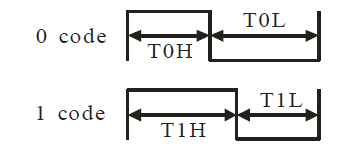I'm in need of some thoughts: I'm using nRF52840 and SDK15.3 to do this but this is mostly a hardware thing.
I need to put out a long (like 7K bits) bitstring with each bit encoded in an NRZ format. Bit length is 1.25uS so this isn't all that fast. Each bit tho looks like:

Where T0H is 400nS and T1H is 800 nS each +- 150nS
The bit stream is changed from time to time in firmware so it needs to be in RAM.
I'm thinking the PWM system can do this somehow through some slight of hand and DMA assist... Has anyone got a suggestion of exactly how to do it?


